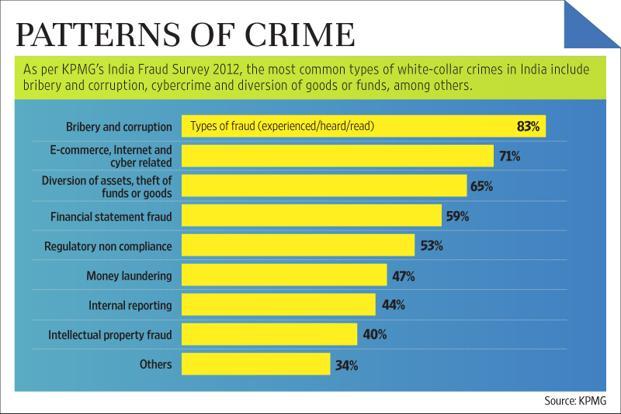White Collar Crime up and Business Ethics Challenged? Is that any surprise considering the vast changes in the world economy over the past four years? With high profile cases like Bernie Madoff and a host of others, I have been asked multiple times if we reached a point where “White Collar Crime” may be on the decline. My response is “heaven’s no!” In fact, there are three components of an ethical lapse and the proliferation of “White Collar Crime” and NEED is at the top of the list!
When the Economy stinks NEED IS HIGH…
To my left is a graph from a KPMG India Fraud Survey – the entire report is found HERE. In their report KPMG states that “White-collar crime in corporate India has witnessed a ‘substantial increase’ over the last two years.”
The graph shows the areas where respondents indicated that fraud had taken place. Interestingly enough, according to the report the incidents of fraud had increased by 10% from 2010 to the same survey in 2012.
According to the KPMG Survey:
Cracking down on fraud is critical for a country that needs investment.
“India is a fast-growing economy. The problem is a level of low confidence in international investors, which stems from corruption,” Rohit Mahajan, partner and co-head, forensic services, KPMG India, said at a press briefing in New Delhi. “Besides international investors, this has also impacted entrepreneurial spirit in India.”
The infringements are of various kinds, with bribery and corruption making up 83% of cases. A large part of the frauds also relate to cyber crime (71%) and diversion of assets (65%). The sectors most affected are financial services (33%) and information and entertainment (17%), according to the survey.
Most frauds (85%) are investigated internally and very little of the money is actually recovered, the survey said. The most effective methods for detecting frauds are whistleblowers, internal audits and data analytics.
The challenge represented by this report is not limited to India. Other data suggests that similar patterns of fraud and white collar crime exist in all developed economies especially those whose development has been spurned by rapid economic growth. India and China for example. The challenge becomes how to stop the proliferation of white collar crime? Policies alone will not be the most significant deterrent. We must stem the gap between ethical policies and practical behavior.
Often misconduct either never gets reported or when reported is somehow never escalated beyond direct managers. This silo of data prohibits effective solutions when combating white collar crime. For purposes of this post however the primary value is to observe the patterns of white collar crime so organizations will have an intelligent methodology to target abuse and curb unethical and potentially illegal practices.
YOUR COMMENTS ARE WELCOME!
As the founder of the Ethics Resource Group, I work with Companies, Associations and Universities bring awareness of Ethical Choices and how to help Employee and Members stay within the ethical boundaries. For more information contact me at chuck@gallagher.pcgdev.com or visit gallagher.pcgdev.com


